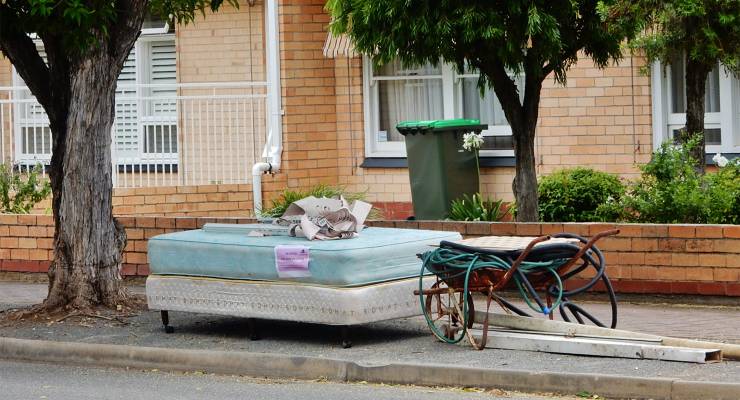
This weekend our neighbourhood participated in what we in Brisbane call kerbside collection, or what I called as a kid “hard rubbish day”.
Many councils have a version of this, which goes as follows: each week, a cluster of suburbs is nominated for kerbside collection. Residents are notified that if they put out large items on the footpath over the weekend, during the next work week the council will send a team with a truck around to dispose of all the items.
Every week the process moves to a new part of the city, and each year every suburb gets this service once.
Unlike a normal person, I observe this great Australian ritual through the lens of economics, seeking out any lessons for how to design more effective and efficient public policy.
Lesson 1: The private sector will take up profitable opportunities
First, people take it upon themselves to find out which suburbs have kerbside collection and drive around on the weekend in their utes looking for valuable recyclable metals, collecting things such as appliances with electric motors for copper and steel.
Others will drive around (or ride their bikes in the case of my kids) and explore for items they might want for their own home or to try and resell online.
Because of this, most of the material put out for collection is gone by the time the council’s team comes around. The council disposes of the rest at its waste dumps.
The economic lesson here is that policy settings can create profitable opportunities that get taken up by the private sector. But that often leaves the unprofitable part to the government, which needs to be funded collectively.
Lesson 2: Transaction costs are bigger than you think
Second, people actively look or accidentally find items that they value, whether that is household furniture, scrap building materials, sporting goods, kids toys, or anything else. But without this coordinating event of kerbside collection, few people would know which neighbour has an item stored at their house that they no longer want. This means that all these giveaways that occur, which add value to both parties, would not occur.
Without this coordinating event, those who collect recyclable metals could not find which household had which items either. In economic parlance, the transaction costs would be too high.
The benefits of coordinating a whole city each year and reducing these transaction costs are huge. Consider simply the cost in time and fuel for a household to take a single trip to the dump in a ute. Or the cost of trying to advertise online and deal with inquiries to sell each item for only a few bucks. The reason retail stores have big mark-ups is because getting the right item to the person who wants it is difficult and costly.
The cost to the council of running of kerbside collection each year is only about $12 a dwelling.
I think it could also be argued that illegal dumping of household rubbish is the product of a coordination problem and that annual kerbside collection solves this too. In a world with kerbside collection, everyone knows that dumping items outside your home is easier than dumping them anywhere else. In a world without, these large items become a problem and the solution is costly to find compared with dumping on the side of the road.
The lesson here is that certain public actions can solve coordination and transaction cost problems on a mass scale relatively cheaply.
Lesson 3: Universal services get huge political support
During COVID Brisbane City Council stopped the kerbside collection program. This was to save $6 million a year that it cost to run the program for the half a million households in the city. The council instead offered a service for pensioners who could call and book a collection of their large waste items.
People were outraged when the universal kerbside collection service stopped, and it was reinstated the following year, replacing the targeted pensioner service.
The lesson here is that targeted public programs usually have less public support compared with universal ones.
This is republished with permission from Cameron Murray’s Fresh Economic Thinking Substack.








There is more rubbish as people no longer value furniture, it is now flat packed and disposable as is bedding.
People come and go from rental properties, and dump it in the street or common areas in flats when they move out. Forget hard rubbish collections, someone else can look after it.
Probably less about not valuing it and more about not being able to afford it, and insecurity of tenure. What do you do with a flat’s worth of furniture if you find yourself couch surfing for a couple of months looking for a new rental ?
I picked up a nice coffee table and a very good framed print of Salvatore Dali’s ‘Persistence of Memory’ from items other people have discarded for the council to pick up.
It reminds me of the difference between ‘junk DNA’ (there’s so much of it in the human genome) and ‘garbage DNA (which is a term which doesn’t exist). Junk is stuff that can be used for other purposes or by other people. Garbage has no conceivable use, although, with a little effort, garbage such as food refuse can be used to make compost.
I live in Brisbane and am amazed every time the collection takes place, at the the number of people in ute or with a trailer that roam the streets looking for goodies.
The only issue I have is with the idiots who think that it’s quite OK to spread someone’s pile of “stuff” over a wide area while scavenging through it, and then leaving an absolute pigsty when they depart.
My local council in Sydney has just stopped the twice yearly kerbside week, instead we have to book for collection from individual residences. We’ll see how that goes.
The article was a great analysis 🙂
My council has compromised by providing everyone with 3 free skip bins per year on demand. This is very handy, can be timed to your clean-outs, and much tidier. They are very popular, hunter gatherers don’t have a whole suburb to do, but I filled one up recently and within a day most of the items were gone. The problem is your neighbors filling it up first! However, people usually wait till the day before pickup. My previous one was filled up with broken baby furniture, but ten cathartic minutes with the angle grinder and it was just a small layer at the bottom.
City of Melbourne only has one collection each a year, which must be booked.
I have been endlessly impressed by Brisbane City Council. Their role is seen to consist of, amongst other things, providing services to their population. They achieve this with not a hint of political sabotage. A lesson for the Feds, maybe?